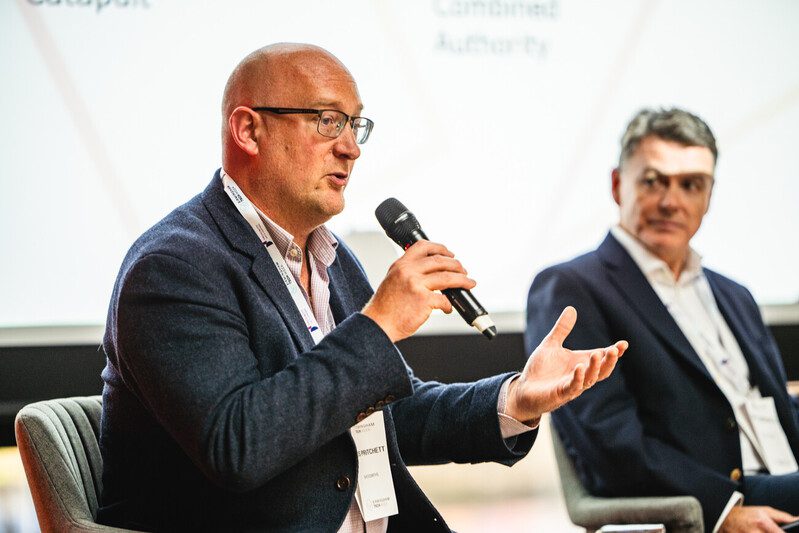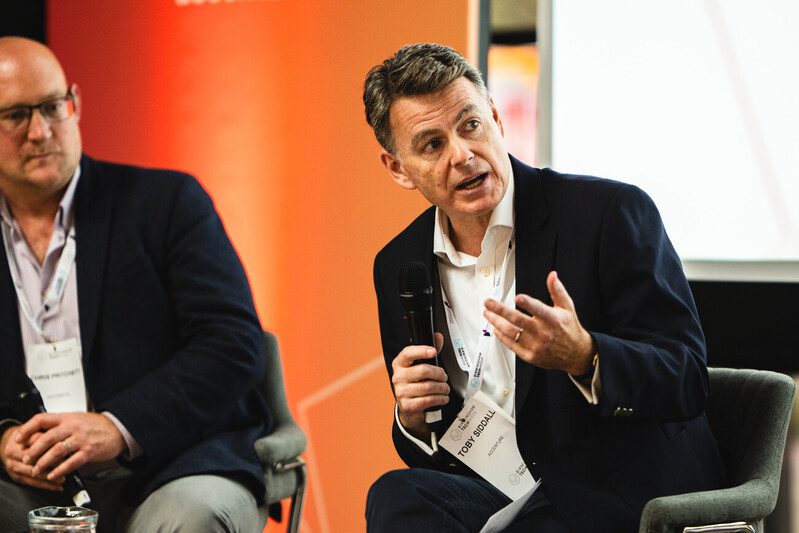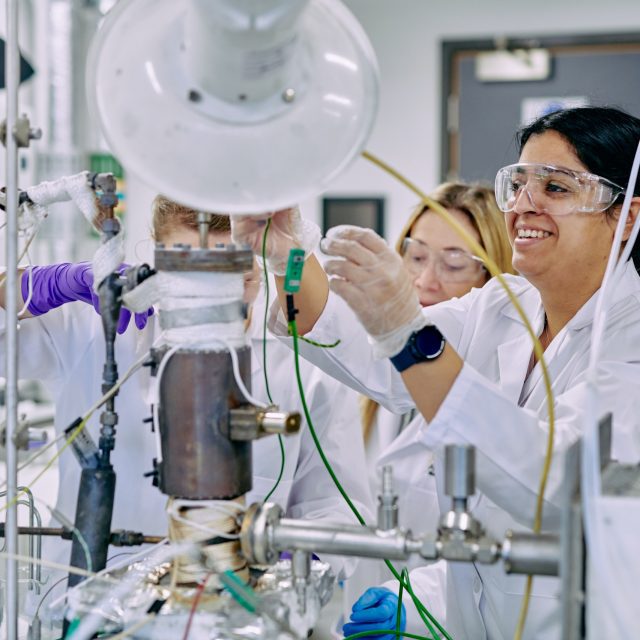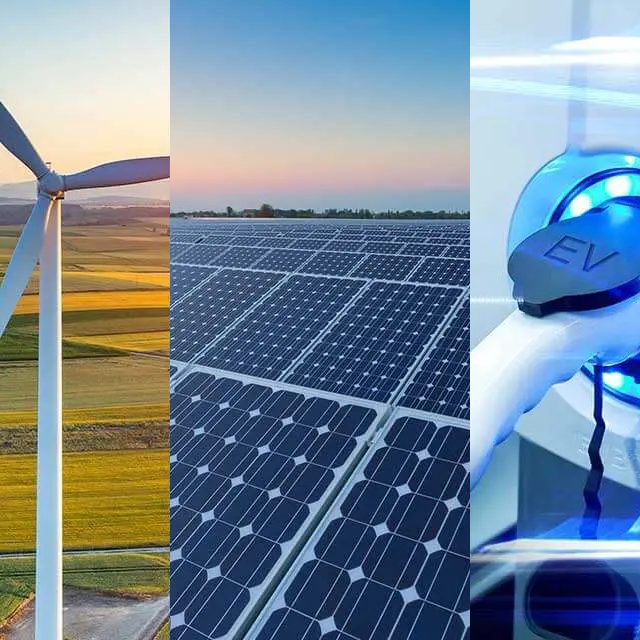What Tech is Driving Britain's Green Industrial Revolution?

Key takeaways:
- Optimisation of energy systems through interoperability is key to move away from fossil fuels
- AI can be used to accelerate projects, increasing the attractiveness of investments
- Centralised, digital platforms can improve collaboration between local authorities and investors
A focus on modernising energy systems is key to driving clean growth and achieving the UK’s 2050 net zero target. As part of Birmingham Tech Week, the West Midlands Growth Company’s Global West Midlands: Tech That Makes Tomorrow Work event covered a dedicated panel session on the importance of modernising the UK’s energy systems and the opportunities and challenges that the UK is likely to face on its journey to a digitised energy future.
Recent advancements in the Internet of Things, Artificial Intelligence (AI), and digital twin models are accelerating the digital transformation of the UK’s energy landscape. Real-time access to data from smart sensors and connected devices has the potential to uncover valuable insights for informed decisions on future energy systems. However, the sharing of data between entities is necessary. There is a need for greater private and public sector collaboration and added support from policymakers, regulators and the UK government to ultimately deliver best practice. Only then can the energy sector respond within operational timescales to deliver a decarbonised energy system across industries.
How will digital & data impact future energy systems?
Access to interoperability and shared data is the absolute cornerstone.
The need for optimisation increases as energy systems move away from fossil fuels towards a decarbonised system based on renewable generation assets. Efficiency will reduce power consumption in future energy systems. Interoperability (the ability for different platforms to exchange, interpret and use data cohesively) is recognised by many in the energy sector as key to unlocking flexibility services.
However, interoperability is multi-faceted, and multiple forms must be considered simultaneously: from consumer, commercial and data to device, physical and vector. Data interoperability maximises the visibility and value of information, providing a shift to a holistic system view.
The Energy Data Taskforce recently made five key recommendations to modernise the UK energy system. Through an integrated data and digital strategy, data sharing can help bridge the gap where key information is absent.
Enhancing grid resilience, providing greater insights into consumption patterns and – more significantly – fostering an innovation-led investment ecosystem will support collaborative R&D projects for clean tech growth with the emergence of new entrants in the energy sector.

Is there a place for advanced technologies, such as artificial intelligence, in the energy system?
Data in digital is key to a faster energy transition.
Infrastructure is critical to achieving the world’s climate goals. In the name of sustainability, collaboration is pivotal for capital and build programmes. Commonly, energy infrastructure projects are expensive and vast. Investors are seeking lower-risk opportunities, which causes challenges for climate-resilience projects. How do you ensure a project remains investable, especially when it involves high upfront costs and a return on investment that is often stalled until some time after completion?
Between now and 2030, adopting technologies such as Artificial Intelligence (AI) can accelerate capital and build programmes by 20%-30%. Improving preventative maintenance and inspection processes using data-driven insights from disruptive technologies will drive down costs for investors.
Both private and public sector organisations are trialling how R&D can create new AI capabilities – addressing challenges associated with a net-zero economy and reducing costs in future capital, and build programmes for investors. National Grid Electricity Transmission’s recent work with deep tech start-ups scaled the UK’s-first trial to fully automate asset inspection, and UK Research and Innovation (UKRI) provided funding opportunities for AI research across energy, transport, environment and agriculture and food systems.

How do decarbonisation, digitisation and decentralisation combine to change the role of place, and bring the local to the forefront?
I think about the opportunities around digitalisation in two lenses, planning and operational.
The West Midlands’ geographic position has meant the region has been historically at the centre of the distribution network. As new and future-generation assets move to coastal areas, the West Midlands’ position in the network is reversed. As such, the region must focus on ‘smart’ systems, developing various technologies, efficiency, flexibility, etc.
Energy planning at a local level requires a shared understanding across all infrastructure, including electricity, gas, heat, water, buildings, transport and digital. It is data that impacts and informs decisions around decarbonisation pathways. There is an emphasis on bringing together different stakeholders to collaborate and develop strategies to compare and cross-fertilise transport, energy and spatial planning processes.
Project PRIDE (Planning Regional Infrastructure in a Digital Environment) will leverage a single digital platform in collaboration with the West Midlands Combined Authority (WMCA), National Grid Electricity Distribution and Advanced Infrastructure. This can help local authorities develop flexible, lower-cost local area energy plans. It would also provide a governance structure to ensure those plans are embedded into network investment decisions. This reduces risk for investors, ensuring the underlying infrastructure is available to support decarbonisation and best value outcomes for communities.
Other examples of private and public sector collaboration exist in the region. Energy infrastructure giant SSE Energy Solutions and WMCA agreed to work together on new regional clean energy projects. This agreement builds on the new partnership between Coventry City Council and E.ON to deliver energy projects across the city.
What are the examples of academia and industry working together?
The World’s Smartest Global Campus
The University of Birmingham, in partnership with Siemens, is combining digital sensor and analytic technologies, AI, decentralised energy generation and storage, renewable energy and concepts that help change users’ behaviour to transform the University’s Edgbaston and Dubai campuses.
CIP alumnus Voltempo secures government funding to create HGV Charging Hub
The Voltempo eFREIGHT 2030 project is set to create up to 200 new jobs by 2030 and provide Birmingham with one of the UK’s first electric vehicle charging hubs dedicated to HGVs.
UK's first circular supply chain for wind turbine rare earth magnets
It’s predicted that in 2040 there will be a 240,000-tonne shortfall of rare earth magnets. The “Re-RE Wind” project is set to combat this impending shortage, bolster the UK’s rare earth material security, foster the creation of green jobs and alleviate the strain on Earth’s diminishing resources.
Foundations laid for Ammogen’s world-leading ammonia to hydrogen project
Project partners Gemserv, Equans, H2Site, Tyseley Energy Park, Yara and the University of Birmingham estimate that over 97,000 jobs and £16bn GVA could be delivered in the UK through early investment in cracking technologies that enable the use of ammonia as a hydrogen carrier.
Adaptation and Building Resilience in a Changing World
Creating the green industrial revolution, together
The West Midlands’ bold pledge to become net zero by 2041 is another reason why the region is poised to lead the way in modernising the UK’s energy systems. This effort will require a joined-up approach across all areas of the industry, from central and local government to academia and manufacturers of all sizes.
With its history of innovation, unrivalled green skills base and strong low-carbon policies, the West Midlands is well-placed to lead the UK into a digitised energy future.
Free support services
We bring together a project team from relevant organisations across the region. This team includes property agents, recruitment consultants, public sector departments and universities. It delivers a comprehensive support package to quickly and easily help you establish and scale your business in the UK.

Take a look at...
Low Carbon
Key Sectors

Sustainable Construction
Key Sectors

